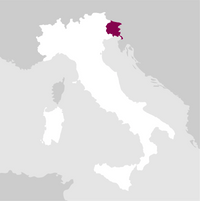Description
Still white wine from Friuli-Venezia Giulia, 13% ABV, produced by Torre Rosazza. 100% Friulano, 2023 vintage. A wine that embodies the elegance and distinctiveness of Friulano, with a deep connection to the terroir. It has clean, defined aromas, including wildflowers, jasmine, and pear. A vibrant, medium-intense yellow color, crystal clear in the glass. On the palate, it is compact and vibrant, easy to drink and pleasant. With good structure and persistence, it reveals a pleasant mineral note that adds a savory finish. Perfect with fish appetizers and delicate first courses.
Tasting notes

Perfume

Color

Taste
Serve at:
10 - 12 °C
Longevity:
03 - 05 years

- Start up year: 1972
- Oenologist: Enrico Raddi
- Bottles produced: 240.000
- Hectares: 74
In the Colli Orientali del Friuli, and especially in Torre Rosazza, the growing of grapevines has a very ancient history. Already known in Roman times, grapes were also grown in the Middle Ages, along with other crops such as olives and grains. In those years, wine was a commodity or a bargaining chip that demonstrated a family’s wealth.
Noble elegance. The history of Torre Rosazza has been tied to the Antonini family, part of the Udine nobility, since the 1600s. Already the lords of the agricultural estate, the Antonini restored the medieval tower and built the villa that became their home in the hills: Turris Rosacea.
After the Antonini, Torre Rosazza passed to the De Marchi family. But more than any other event, the biggest mark on its history was left by the two World Wars. After the Battle of Caporetto, the estate came under Austrian control before returning to Italy at the end of the war. During the World War II it was the scene of fighting between the German occupation army and the Italian Resistance. Read more


| Name | Torre Rosazza Friulano 2023 |
|---|---|
| Type | White still |
| Denomination | Colli Orientali del Friuli DOC |
| Vintage | 2023 |
| Size | 0,75 l |
| Alcohol content | 13.0% by volume |
| Grape varieties | 100% Friulano/Sauvignon Vert |
| Country | Italy |
| Region | Friuli-Venezia Giulia |
| Vendor | Torre Rosazza |
| Origin | Oleis di Manzano (Udine) |
| Climate | Altitude: 130 70 m. a.s.l. |
| Soil composition | Marly and eocenic. |
| Cultivation system | Guyot |
| Plants per hectare | 4,500 kg/hectare |
| Yield per hectare | About 6,000 kg. |
| Fermentation temperature | 16 °C |
| Wine making | The destemmed grapes are softly pressed and macerated at low temperatures. Alcoholic fermentation occurs in steel at a constant temperature of 16°C. |
| Aging | The wine remains in yeast for about 4 months and after bottling, it is refined in the bottle for at least 2 months. |
| Allergens | Contains sulphites |





